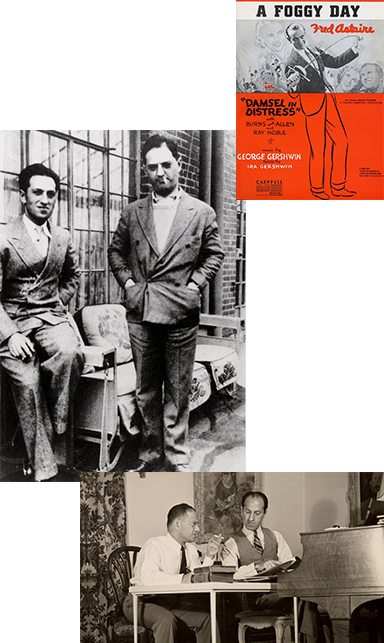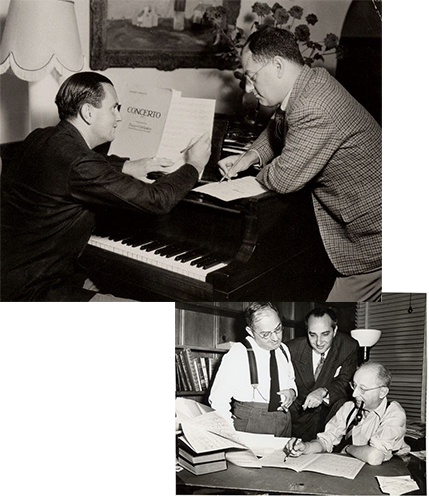The Gershwin Brothers
The Gershwin Brothers
Words and Music That Transcend Time
George and Ira Gershwin will always be remembered as the songwriting team whose voice was synonymous with the sounds and style of the Jazz Age. By the time of their 1924 Broadway hit, LADY, BE GOOD!, George had worked with lyricist Buddy DeSylva on a series of revues, GEORGE WHITE’S SCANDALS, while Ira enjoyed success with composer Vincent Youmans on TWO LITTLE GIRLS IN BLUE. But from 1924 until George’s death in 1937, the brothers wrote almost exclusively with each other, composing over two dozen scores for Broadway and Hollywood. Though they had many individual song hits, their greatest achievement may have been the elevation of musical comedy to an American art form. With their trilogy of political satires — STRIKE UP THE BAND, the Pulitzer Prize-winning OF THEE I SING, and its sequel, LET ’EM EAT CAKE (all three written with playwrights George S. Kaufman and Morrie Ryskind) – they helped raise popular musical theatre to a new level of sophistication. Their now-classic folk opera, PORGY AND BESS (co-written with DuBose Heyward), is constantly revived in opera houses and theatres throughout the world. Concurrently with the Gershwins’ musical theatre and film work, George attained great success in the concert arena as a piano virtuoso, conductor, and composer of such celebrated works as RHAPSODY IN BLUE, AN AMERICAN IN PARIS, and the CONCERTO IN F.

Ira Continues
After George’s death, Ira continued to work in film and theatre with collaborators ranging from Kurt Weill and Jerome Kern to Harold Arlen, Burton Lane, Vernon Duke, and Harry Warren, among others, writing such standards as “Long Ago (and Far Away)” and “The Man That Got Away,” both nominated for Academy Awards.
Ira’s book, LYRICS ON SEVERAL OCCASIONS, was published to critical acclaim in 1959; it was a unique selection of his lyrics, accompanied by his annotations, observations, and anecdotes. In addition to his own career, Ira attended to the details of his brother’s estate and the Gershwin legacy. He annotated their manuscripts and consigned to the Library of Congress all the materials that pertained to their careers. In 1983, at the age of 86, Ira died in his Beverly Hills home.
Today, the Gershwin catalog has been taken up by a younger generation who have delighted in vintage and contemporary recordings, revivals, and the “new” Gershwin musicals, MY ONE AND ONLY (1983) and the 1992 Tony Award winner for best musical, CRAZY FOR YOU. The United States Congress awarded the Congressional Gold Medal to the Gershwins in 1985 (only the third time that songwriters had been so honored), and in 2007, the Library of Congress instituted the Gershwin Prize for Popular Song.
